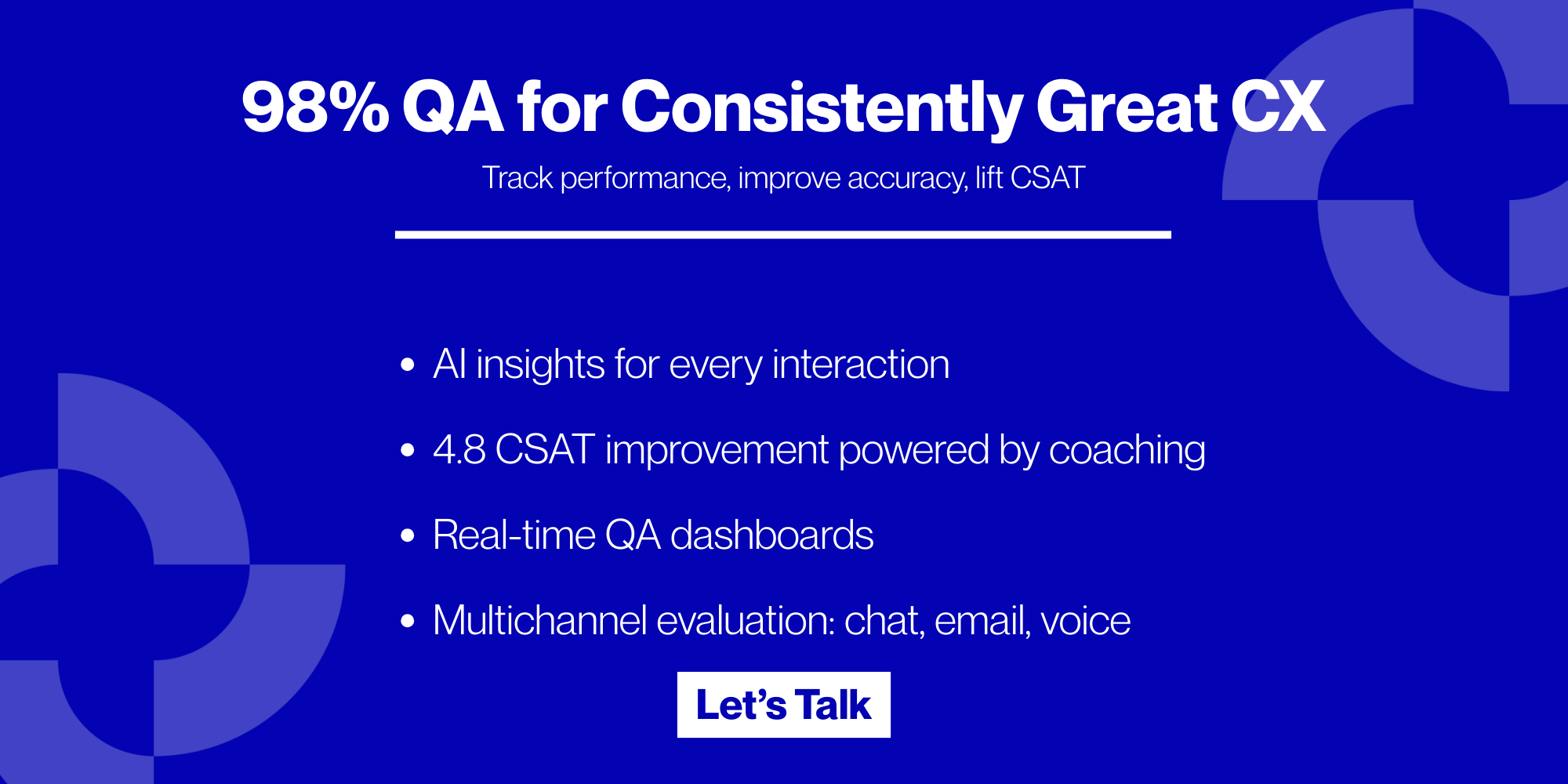Key Takeaways
- Get an in-depth understanding of business process excellence meaning and frameworks.
- Benefits of the process excellence include,
- Increased productivity and efficiency.
- Cost reduction.
- Improved quality
- Enhanced customer satisfaction
- Agile workforce
- Enables scalability
- Key differences between process excellence, operational excellence, and business process excellence.
- Understand the methodologies used in business process excellence.
In today’s competitive environment, process excellence is the foundation for scalability, agility and customer experience transformation. For consumer brands and D2C companies with $5M+ in revenue and growing CX teams, process excellence gives faster resolutions, higher CSAT scores and increased ROI.
It is always important to stay ahead and updated on the competitors. Through this, you can enhance productivity. So, what is the role of process excellence in developing your business? Well, this blog gives you a detailed understanding of process excellence, process excellence meaning, process team and why you need one.
Come, let us dive deep into the world of business process excellence and understand every nook and corner of it!
What is process excellence?- Process Excellence Definition

Process excellence refers to a strategy that usually involves continually improving the efficiency, effectiveness, and quality of business processes and operations through an operational excellence framework. It perfectly combines process design, process management, process improvement, and process management techniques like Lean, Six Sigma and Kaizen.
The main objective of process excellence is to achieve smooth, consistent and measurable workflows. The process excellence framework involves assessing, testing, and modifying the process until a quality standard is achieved. There are a few factors that determine the excellence of the process. They are
- Efficiency
- Accuracy
- Consistency
- Visibility
- Measurability
- Flexibility
- Security
- Compliance
- Alignment with the business strategy
- Boost to customer satisfaction
- Meets business targets or goals.
For growing D2C brands with $5M+ revenue, process excellence leads to faster resolutions and better CSAT scores.
For CX leaders (VPs, Directors, Senior Managers), adopting process excellence directly impacts operations while reducing handle times, improving first-contact resolution and scaling without increasing cost.
Process Excellence team

The process team is a group of skilled people or a structure that puts effort into making the business process successful. They play a major role in identifying, analyzing and optimizing the business process to enhance the efficiency and quality of the business. Here is a detailed analysis of the roles of process excellence. In consumer brands, this team bridges CX strategy with execution, ensuring that frontend insights turn into backend efficiency.
Beginning with the process excellence

To begin the journey with the business process, you need to have a detailed knowledge of your existing process. Take a deeper look at these 10 pillars of the process team and process excellence.
1. Process Discovery
To identify the process, you first need to have a deeper understanding of the existing process to know about the pain points, areas of improvement, and bottlenecks. Through this, you can identify the process you need to focus on. You can make use of the tools to discover the process. Most VPs, directors, and senior managers often begin from here when scaling from basic support to more structured and insight-driven operations.
2. Process Analysis/Process Mapping
Once you have discovered the process, the next step is the process analysis. Process analysis is the systematic study of finding out how the process works and how you can improve it. Through process mapping, you can analyze the existing process, and the process can be designed according to the findings of the process mapping.. What are the benefits of the process analysis? With the help of the process analysis, you can identify the issues across the organization and rectify them with effective tools. Through this, you can improve the customer experience. For D2C companies and consumer brands operating in the US, UK, and Australia regions, mapping isn’t just about efficiency! Instead, it’s how you connect frontline insights to backend improvements.
3. Process Improvement
Through process improvement, you can unlock ways to improve efficiency and opportunities for reducing costs. For this, the process needs to be checked regularly. This is to ensure that the process stays in line with the overall organizational goals.
4. Process Design
The primary goal of the process design is to create an ideal path for the process to meet the customer’s goals and organizational needs. The process design starts with specific objectives and goals. It primarily focuses on how the resources are utilized to optimize the process.
5. Process Monitoring
Process monitoring is a process to ensure that the process team is meeting objectives and delivering premium quality results. With process monitoring, you can get real-time performance insights and prevent any form of process deviation. There is a wide range of software available that can help the process team with process monitoring.
6. Process prediction
With the help of advanced technologies like machine learning, you can predict the process outcomes based on the results and insights you get from process monitoring. With the help of prediction, you can trust a new version of the process.
7. Process Optimization
With the process optimization, the process team evaluates and improves the process to elevate the efficiency and effectiveness. Through process optimization, you can reduce wastage and improve production. You can improve a company’s bottom line with the help of process optimization.
8. Process Automation
As the name suggests, process automation is the method that uses technology or other software to speed up the manual process. Through this technology, you can automate complex business processes. The main use of this method is to reduce errors and loss of data. For D2C brands, automating repetitive queries like order tracking frees agents for high-impact work.
9. Process Standardization
To match the business standards and the company’s policies, process standardization is important. With standardization, you can establish a consistent process across the organization.
10. Process Governance
Through process governance, you can establish standards, policies, and guidelines for process management. With process governance, the organization can establish and track adherence to the policies.
Benefits of Process Excellence Strategy: Why do you need one?

Wondering why is process excellence important? If you are planning for noticeable growth and development in your business, process excellence plays a pivotal role. Here are the key benefits of process excellence and why you need one for your organization.
Increase your business efficiency
By giving you a keen understanding of the business’s weaknesses and the areas of improvement, the process excellence helps you to increase the efficiency of your business. With the help of business process excellence, you can refine the process and reduce wastage, minimize errors, and make use of the resources effectively. You can even speed up the process and make them cost-effective. Through this, you can create a competitive edge in the industry.
Boosts Customer Satisfaction
The ultimate goal of the business is to improve the customer experience and satisfaction. In today’s fast-paced, competitive business world, your business needs to stay ahead and meet the customer’s expectations. With the help of business process excellence, you can give goods and services to your customers at a greater speed and with a higher quality. Business process excellence helps you to have an in-depth understanding of the customer’s pain points, needs, and preferences. Atidiv’s clients have achieved CSAT scores of 4.8+ through structured improvements.
An Agile Workforce
With a continuous review of the process, the process team can understand how the company behaves and change the approach of the company. It is all about how quickly the team is adapting to the market changes. With the help of process excellence, you can build a more agile workforce.
Improves Profitability
By improving efficiency, reducing wastage, and cutting costs, process excellence can aid in increasing the profit of the business. Effective business process excellence is ideal for limiting the cost and speeding up the process. With the help of Atidiv, you can improve the profitability of your business. With margins tightening, most VPs, senior managers and CX heads are leaning on process excellence to achieve savings without sacrificing quality. Atidiv helped a U.S.-based online retailer save $1.3M annually through process reengineering.
Drives innovation
Innovation is the key to excellence. With the help of process excellence, you can unlock creative ways to improve your business and come up with innovative ideas. Through this, you can always keep your company or organization one step ahead of your competitors.
Ensures Scalability
With the help of process excellence, you can ensure the smooth running of your business growth. The whole process becomes chaotic if you do not have proper scalability. With business process excellence, you can make sure your operations are running smoothly.
For consumer brands with $5M+ revenue, applying Lean + Six Sigma frameworks often yield improvements of 30–50% (McKinsey).
Process Excellence Methodology

Take a look at these seven proven methodologies that can be used to improve the efficiency of your business processes.
- Six Sigma: It is one of the most popular process excellence methodologies that primarily works on the data-driven process. It greatly helps to reduce process defects and variability. The primary goal is to optimize consistency, which results in customer satisfaction. The two main processes of the Six Sigma method are,
- DMAIC: Define, Measure, Analyse, Improve, and Control
- DMADV: Define, Measure, Analyse, Design, and Verify
- Lean: The main aim of this methodology is to minimize waste and maximize output. It mainly aims at eliminating the activities that do not add value to the overall customer satisfaction. The seven wastes that the business should focus on eliminating are
- Defects
- Overproduction
- Inventory
- Waiting
- Transportation
- Over-processing
- Motion
- Total Quality Management: Total Quality Management focuses on achieving long-term success. Customer satisfaction is also a prime motto. The main focus of this method is the overall improvement of the business, which also means the employee improvement, business improvement, and making use of the techniques that are efficient and beneficial.
- Continuous improvement(Kaizen): Kaizen in Japanese means “ Continuous improvement”. This methodology emphasizes making even the smallest improvement can bring big changes and success to your business. It focuses on employee involvement, continuous learning, and teamwork.
- Business Process Reengineering: BPR methodology aims at continuously redesigning and improving the business process to achieve a higher performance rate. Some of the notable metrics of the BPR include cost efficiency, waste reduction, faster process, and top-notch quality. With the help of BPR, you can challenge the organization to have a thorough analysis of the “as-is” process through leveraging technology and aim at delivering a new process that will give the desired results.
- 5S Analysis: 5S analysis, also known as the 5 Whys analysis, originated in Japan. It primarily focuses on identifying the root cause. Its name originated from its 5 steps to eliminate wastage within the process and improve the productivity and efficiency of the process. The 5 steps are
- Sort
- Set in order
- Shine
- Standardize and
- Sustain
Several leading consumer brands with $5M+ revenue perform 5S analysis to reduce response times and increase first-contact resolution.
Process Excellence VS Business Process Excellence VS Operational Excellence

Process Excellence, operational excellence, and business process excellence are interconnected. The prime motive of these processes is improving the performance of the organization. But have you ever thought about the differences between these three? Well, let us see the key differences.
- Process excellence: Process excellence is the practice in which the process team continuously puts effort into boosting the efficiency of the business process and operations. Process excellence is often considered to be a subset of operational excellence.
- Operational excellence: Operational excellence primarily focuses on reprising the improvement and the daily activities of the process. With operational excellence, you can mitigate the risks and reduce the conflict and overlap. This involves all the tools and methods required for the process.
- Business process excellence: Business process excellence comprises both process excellence and operational excellence. Business process excellence plays a pivotal role in enhancing the overall development of the business in the future. It primarily focuses on customer value creation and long-term growth.
Final Thoughts
Having a process excellence team is essential for brands aiming to scale customer experience and operations in the U.S., U.K. & Australia. It is an absolute necessity for any business or organization aiming to upgrade their business to higher levels and bring strategic improvements. With the help of continuous improvements, redesigning the process, and teamwork work you can get the desired results. With the help of business process excellence, you can enhance productivity and elevate customer satisfaction. We hope this blog has given you a proper insight into the process excellence and how it works.
Case Study Example: Atidiv enabled $20M+ savings, 95%+ QA and high-volume scalability for a global aggregator (read more).
Atidiv is your trusted partner you can rely on. We will help you with the top business process team and leverage technologies to upgrade your business to the next level.
For more information, contact us!
FAQs on process excellence
1. Why is process excellence important?
Process excellence is important to improve business operations and create value for customers.
2. What is a process excellence team?
The process excellence team is a strategic team in the business operations that primarily focuses on elevating the business operations and enhancing the overall customer satisfaction.
3. What are the methodologies that the process team uses?
- Six Sigma
- Lean
- Total Quality Management
- Kaizen
- Business process reengineering
- 5S Analysis.
4. How does technology support process excellence in 2025?
With the help of enhanced technology and tools like performance dashboard, process mining, workflow automation and AI-enabled prediction tools, you can speed up the process and bring visible improvements in the process.

